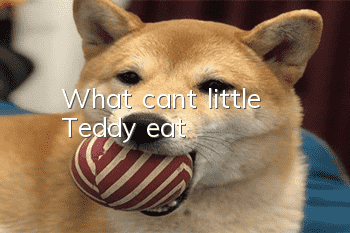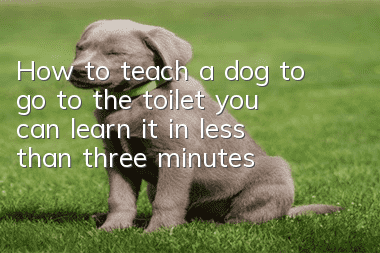What can’t little Teddy eat?

Jelly
Jelly: It is a sweet food and it is recommended not to feed it as much as possible.
Beans and their products
Pickled dried tofu: It contains too much salt and seasonings, so it is recommended not to eat it.
Vegetables and fruits
Seasonings such as onions, garlic, pepper, chili, mustard, mustard seeds, and ginger: will affect the dog’s olfactory sensitivity, so you must not feed it.
Kelp: You can eat it.
Cereals and potatoes: rice cakes: may block the throat or stick to the throat, causing suffocation.
Animal food
Meat: If it is meat, except for pork, it is generally better for dogs to eat raw.
Fish: It is best to feed fish to teddy bears if it is cooked or canned. Fish that contain more fat are difficult to digest and should not be given to dogs.
Shrimp, crab, cuttlefish, octopus, jellyfish, etc.: eating these can easily cause indigestion to dogs, and they should not be fed to dogs.
Chocolate
Chocolate [can be fatal] Theobromine in chocolate reduces the blood flow to the brain of animals, which may cause heart disease and other fatal problems. The higher the purity of chocolate, the higher the content of theobromine it contains, and the greater the risk to dogs.
Onions: Eating too many onions can easily cause poisoning. Raw or cooked onions and scallions contain disulfide, which is harmless to the human body but can cause oxidation of red blood cells in cats, dogs, sheep, horses, and cattle. May cause hemolytic anemia. The symptoms include the discharge of strong brown hematuria within one or two days after eating, accompanied by dysentery and vomiting, so special attention should be paid to this.
Bones:
When it comes to dogs, it is always said that they love to chew bones, but if you need to feed them bones to supplement calcium, beef bones and pig bones are better. Chicken bones are not suitable. Chicken bones are relatively brittle and can easily break into small pieces after being chewed into pieces. The tips of the small pieces are particularly sharp and can easily scratch the stomach and intestines if the dog swallows them. Fish bones are also as dangerous as chicken bones and should not be eaten by dogs. But for canned fish, the bones are already crispy, so it’s not a big problem. If you want to feed bones, cook them in a pressure cooker. Bone marrow is an excellent source of calcium, phosphorus, and copper. Chewing large bones can help remove tartar.
Chicken legs, chicken breasts, etc.: are rich in high-quality protein, but the disadvantage is that they contain too much phosphorus. If you feed your dog with fully nutritious dog food, you must be extra careful when feeding your dog other foods. Because it is easy to create new nutritional imbalances.
Raw or cooked liver [Danger]: A small amount of liver is good for dogs, but too much can cause problems. Because liver contains a lot of vitamin A,Can cause vitamin A poisoning. About three chicken livers (or corresponding amounts of other animal livers) a week can cause bone problems.
Raw Eggs (Dangerous): Raw egg whites contain a protein called avidin, which can deplete your dog's body of vitamin H. Vitamin H is an essential nutrient for dog growth and coat health, and raw eggs often contain germs. Hard-boiled eggs are perfect for it.
Raw meat and poultry [Dangerous ~ Fatal]: The dog’s immune system cannot adapt to artificially raised poultry and meat. The most common types of bacteria, Salmonella and Bacillus, are very dangerous to dogs.
Pork [not recommended for feeding]: The fat globules in pork are larger than other meats and may block the dog’s capillaries. Avoid pig products, especially bacon, which contains sodium nitrate.
Eggs: Egg yolks can be eaten. Egg yolks can beautify the hair. The protein in the egg whites cannot be absorbed by puppies, so it is easy to have diarrhea.
Pure thermal energy food
Sweet foods: A craving for sweets is probably a common problem among dogs and humans, but sweets such as snacks and sugar can easily lead to obesity, and can also easily lead to insufficient calcium absorption and dental caries, which is not good for dogs at all. Especially as an indoor dog lives with the family all day long, it is easy for the owner to feed it cakes and other things during their free time. For the sake of your dog's health, please don't do this.
Milk [not recommended]: Many dogs are lactose intolerant. If your dog develops gas, diarrhea, dehydration or skin inflammation after drinking milk, you should stop feeding milk. Dogs with lactose intolerance should consume milk that does not contain lactose.
Ready-to-eat dried fruits and vegetables
Mushrooms [Not recommended ~ fatal]: Commercially available edible mushrooms, mushrooms, etc. are harmless to dogs. However, it is better to avoid letting dogs eat them to avoid developing the habit of eating mushrooms and accidentally eating poisonous mushrooms in the wild.
Seaweed: It may block the throat or stick to the throat, causing suffocation.
Bread and biscuits/puffed goods
Bread: It is recommended not to feed bread with high salt or sugar content to avoid excessive salt intake or obesity. Excessive salt will inevitably increase the burden of kidney excretion, affect kidney health, disrupt body fluid balance, and cause various skin diseases.
Candy
Can’t eat any kind of candy
Chewing gum
Chewing gum: Do not feed. If he eats it by mistake, there is nothing you can do. Pay more attention to whether his diet is normal, just like a child eating chewing gum. Chewing gum will not be digested in the body. Just wait for him to pull it out.
Coffee/tea/drinks/ice cream
Ice cream/ice cream: sweet food, which may cause obesity or diarrhea.
Peanuts/melon seeds/nuts
Peanuts: Food that is not easy to digest and may cause abdominal pain and diarrhea.
Dried fruits/plums
Other snacks
Vitamin C: Do not let your dog take in too much vitamin C. Dogs can synthesize vitamin C in their bodies from the meat they eat. Therefore, there is no need to feed your dog fresh vegetables and fruits containing vitamin C. Eating too much can easily cause indigestion, so you should pay attention to this.
Coconut: You can eat it.
- When should puppies be vaccinated?
- How to keep your pet dog healthy
- How to choose dog food for senior dogs
- Instructions and precautions for using external insect repellent drops for dogs
- My puppy seems to have something in his throat and keeps retching. What's going on?
- What are the symptoms of puppy poisoning?
- What should you do if your dog has bad breath?
- Dog vaccination reactions
- How to treat dogs vomiting bloody mucus
- How much water do dogs need every day?



